ETHICS FIRST TECHNOLOGY
MOHAMMED AL KAFF AL HASHMI, CO-FOUNDER OF ISLAMIC COIN, TELLS CNME HOW THE UNIQUE CRYPTO COMPANY IS EMPOWERING FINANCIAL BALANCE WITHIN THE COMMUNITY.



















MOHAMMED AL KAFF AL HASHMI, CO-FOUNDER OF ISLAMIC COIN, TELLS CNME HOW THE UNIQUE CRYPTO COMPANY IS EMPOWERING FINANCIAL BALANCE WITHIN THE COMMUNITY.


















It’s fair to say that the cryptocurrency industry has taken some flak over the last 12 months.
High-profile public scandals involving FTX, and investigations by the SEC into Binance have severely dented investor confidence.
It has created an environment, especially in the United States, where financial regulators are cracking down on cryptocurrency exchanges. However, on the front cover of August’s edition of CNME, we feature a company that is looking to completely change the way you think about cryptocurrency.
Islamic Coin are on a mission to provide financial fairness and equality for their members.
The company has adopted a model called Sharia Finance.
Islamic Coin claim that Sharia Finance is a financial system that actually cares about ethics and values, and it is embedded in its principles as a company.
CNME spoke to Mohammed Al Kaff Al Hashmi, Co-Founder of Islamic Coin, to learn more about the company’s mission statement, what ultimately differentiates the unique crypto player from other exchanges in the marketplace – and the philanthropic projects it pursues.
Al Hashmi said the company has been designed for his community, who he believes have been underserved.
“We feel that traditionally our community has been underserved, and we aim to rectify that, and we feel the best way to do that is through blockchain, crypto and smart contracts.”
It is an excellent interview, and one that leaves you with a very different view on cryptocurrency, and is a somewhat refreshing approach to economics amidst the backdrop of the current financial climate.
There are a number of other blockbuster interviews in August’s edition of CNME.
Avlesh Singh, CEO of WebEngage gave us a telling insight into how their marketing automation platform is really empowering marketing professionals with the tools they need to do their job more effectively. However, he conceded that it will take time for them to change their mindset in terms of their reliance to invest a significant chunk of their budget on adverts on Google and Meta.
We also managed to speak to Nicholas Watson, CEO of Udrive.
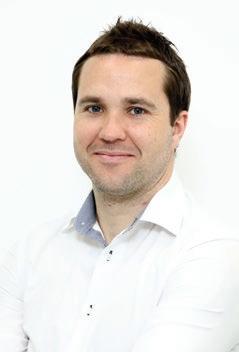
The car-sharing platform has enjoyed phenomenal success since its inception a few years ago, and continues to go from strength-tostrength.
He highlighted their unique partnership with RTA, and outlined his plans to expand Udrive across the Middle East region.
Rob Beswick is the Managing Director for Virgin Mobile UAE, and he stressed the importance of delivering seamless digital experiences. Virgin’s demographis Generation Z and he explained how their tailor their business model to meet the demands of their end-users, whilst he also provided details on an exciting new collaboration with The Entertainer application.
Motorola Mobility has enjoyed a renaissance of late, driven primarily by the success of their ThinkShield product portfolio, and a more strategic approach to their global business.
Sudhir Chadaga is the Chief Strategy Officer at Motorola Mobility and he provided a fascinating insight into how the company has completely transformed its operations – and its plans to continue to grow its market share in the US, India, Middle East, and Latin America.
There are also brilliant interviews with Cypher Capital, Hedera, Confluent and Lottoland, and also some excellent thought leadership commentary from BenQ and Heriot-Watt University.
Enjoy!
Mark Forker EditorIslamic Coin are on a mission to provide financial fairness and equality for their members.”
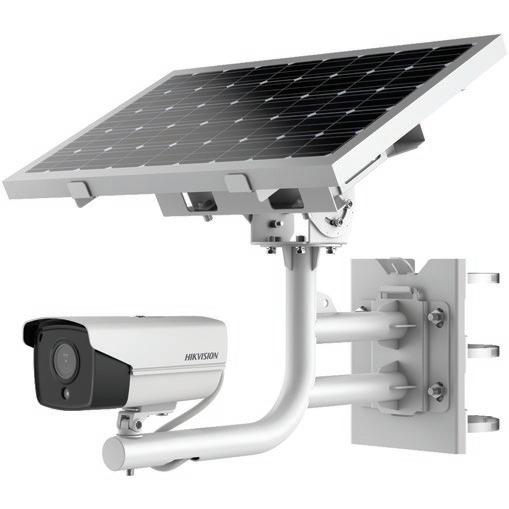



Powered by solar energy, this kit sets up without any electrical wiring. Easy set up without mechanical equipment-reducing the installation costs and time.
Prone to extreme weather such as strong wind and rainstorms.
 20 Ah lithium MP @ 30 fps 2 W 40 scale 12 4 G IP67
20 Ah lithium MP @ 30 fps 2 W 40 scale 12 4 G IP67
10 Sudhir Chadaga, Chief Strategy Officer at Motorola Mobility, highlights the impact its ThinkShield product line has had in turning the company's fortunes around.
14 Fred Crehan, Area Vice President, Emerging Markets at Confluent, reflects on the company's last 12 months - and explains why there has been an increase in Kafka adoption.
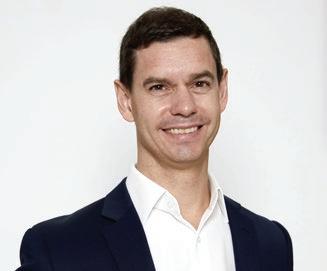
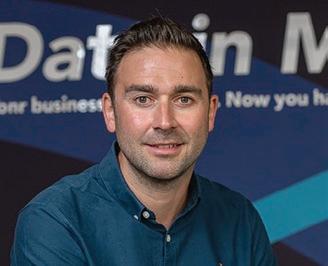
30 Rob Beswick, Managing Director at Virgin Mobile UAE, talks about their new partnership with The Entertainer application, the need for seamless experiences - and what differentiates them from other providers.
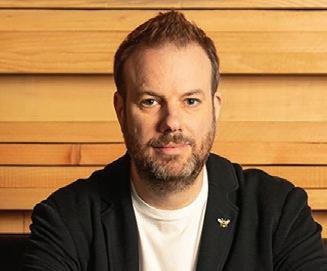
CNME rounds up the biggest regional and global developments in enterprise technology, which includes the news that F5 has strengthened its relationship with Google Cloud in Qatar, Axis and AlJammaz announce a new partnership in Saudi Arabia - and a work index report commissioned by Microsoft shows the impact of 'digital debt'.


40 Nicholas Watson, CEO of Udrive, tells CNME how their revolutionary car-sharing platform is transforming the mobility sector across the UAE.
46 Avlesh Singh, CEO of WebEngage, outlines how their marketing automation platform is enabling their customers to generate more revenue via online conversion.
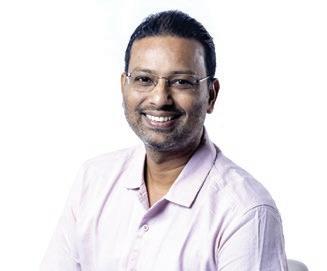
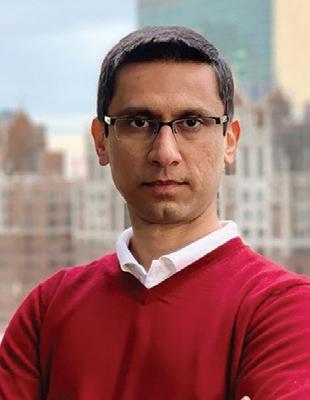
Tenable announced new enhancements to Tenable OT Security, helping customers strengthen the security of their OT environments through the management of IT/OT and IoT assets on the market.
Marty Edwards, Deputy CTO for OT/ IoT at Tenable, said, ”All too often, OT, IoT and BMS devices are overlooked, yet in today’s converged environments, security teams need a simple, unified view of their overall risk. Tenable OT Security addresses this, enhancing visibility to reduce the attack surface”.

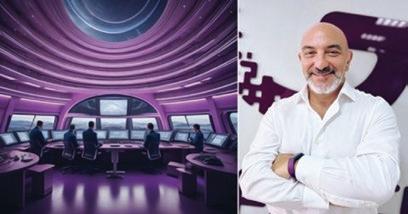
GELLIFY sets its sights on revolutionising the luxury industry with the unveiling of its groundbreaking initiative, the” Luxury Tech CX Observatory”. The newly launched observatory will serve as a dynamic collaborative environment, empowering luxury brands to access invaluable resources, learn from industry experts, and engage with innovative startups.
Massimo Cannizzo, CEO and Cofounder of GELLIFY Middle East,
expressed his excitement about the groundbreaking venture: "At GELLIFY, in a fast-changing luxury customer expectations, we are devoted to driving innovation and reshaping the customer experience by harnessing the potential of advanced technology. Drawing from our rich heritage in Milan, Italy the global epicenter of fashion and luxury, we are extending our deep-rooted expertise to Dubai, a burgeoning hub for luxury brands. This is more than just embracing the latest trends; it's about scripting a transformative narrative for luxury in the digital age. Dubai, with its growing reputation as a luxury hub, presents the ideal setting for this exciting venture".
Saudi Arabia’s Mozn recently announced that it has been recognised as one of the Top 200 FinTech Companies globally, and one of the Top 25 in the “Digital Business Solutions” category by Statista.
"We are immensely honoured to be
recognised as one of the World's Top FinTech Companies in 2023 by Statista, and to be the company representing the Kingdom of Saudi Arabia in the report", said Dr. Mohammed Alhussein, Founder and Chief Executive Officer at Mozn. "This esteemed recognition is
not just an accolade, but a testament to our unyielding commitment to driving financial security and compliance through AI technology in alignment with the Saudi Vision 2030. It further fuels our inspiration and resolve to continually raise the bar, innovate, and make significant strides in our mission to redefine financial safety and integrity. As we continue to expand, we pledge to remain at the forefront of technological innovation, ensuring our solutions are always reliable, effective, and ahead of the curve".
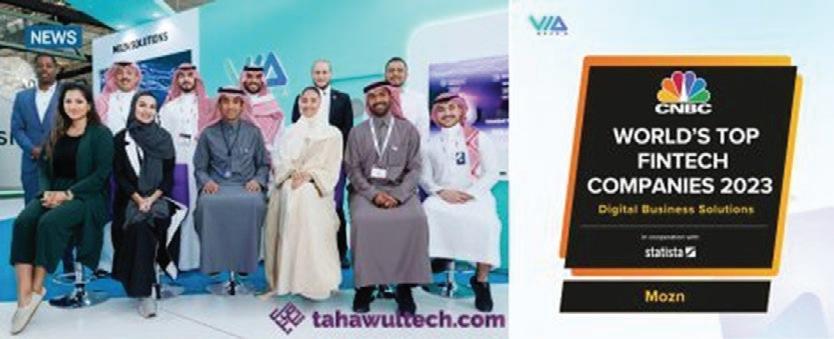

BEDU recently announced a bold strategy set to change how individuals and enterprises engage with the digital realm. The announcement comes at a time when the company is targeting substantial growth and regional industry leadership through a pre-seed investment round.
The global AI investments projected to reach $110 billion by 2024 and by 2030, the market impact of AI is expected to be even more significant,
with estimates indicating that AI could contribute up to $15.7 trillion to the global economy. With that BEDU’s long-term vision, announced today, represents fertile ground for investment. The company will bring AI and blockchain into industries to redefine them, harnessing the farthest outskirts of tech to bring new user experiences that connect, engage, and entertain.
“We’re at an exciting juncture", said Amin Al Zarouni, CEO, BEDU. “Our vision, coupled with this investment opportunity, represents a unique chance for investors to be part of a transformative journey. With our portfolio of innovations and a pre-seed round, we're poised to forge a future that will shape the very essence of the digital realm”.
SANS Institute, the global leader in cyber security training and certifications, announced its upcoming training program SANS Riyadh Cyber Leaders 2023, to be held from August 20 - 24, 2023, at the JW Marriott Hotel Riyadh.
In an increasingly complex threat landscape, this intensive course is designed to empower security leaders in managing risks, creating and leading high-performing security teams, and strategising proactively.
Ned Baltagi, Managing Director, Middle East, Turkey and Africa at SANS Institute said, "With the rising frequency and sophistication of cyber threats, creating a culture of cybersecurity awareness within an
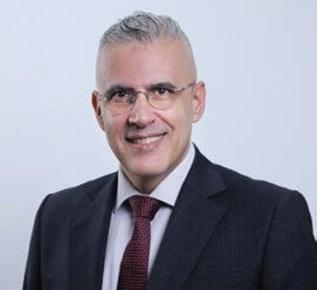
organisation is crucial. In the event of a cybersecurity breach, leaders must be able to respond quickly and effectively to minimise damage and ensure business continuity".
Employees across the world today are facing an unseen challenger at work and this is costing their organisations time that could be better spent innovating. Organisations that move first to embrace AI will break the cycle — increasing creativity and productivity for everyone. These were the key findings of Microsoft’s 2023 Work Trend Index (WTI) Report: Will AI Fix Work
“This year’s report highlights a growing concern among both employees and employers about how maximising their productivity often leaves them with little time for more creative and innovative work”, said Naim Yazbeck, General Manager of Microsoft UAE. “The report also revealed that a large number of professionals in the workforce today are looking forward to next-generation AI helping to lift the weight of work. However, for this to happen, business leaders have to ensure that they are empowering their employees with the skills necessary to properly and responsibly leverage AI”.
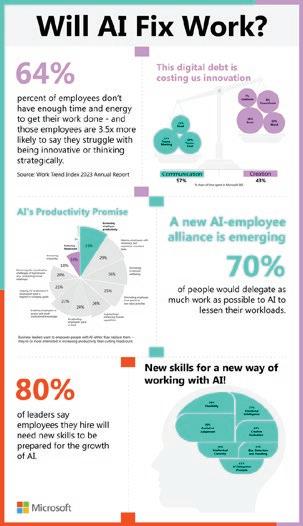
Axis Communications, the global leader in network cameras, access control, and network audio devices for the physical security and video surveillance industries, announced the onboarding of AlJammaz Technologies as its newest distribution partner in the Kingdom of Saudi Arabia.
As such, one of the critical advantages of this alliance is the ability to provide end-to-end solutions that encompass every aspect of security. From highquality cameras and advanced video analytics to network infrastructure and management software, customers can rely on the KSA-based distribution network developed by Axis to deliver integrated solutions that enhance security operations.
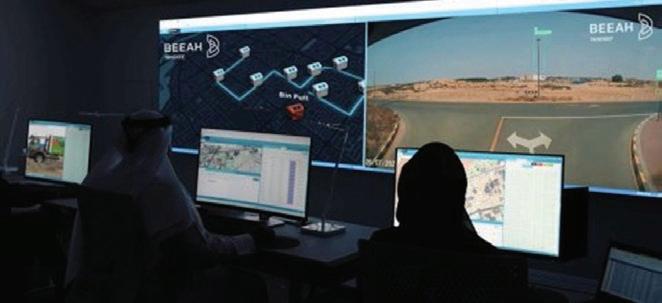
"As a trusted distributor in the region, we are delighted to partner with Axis Communications", said Adel Qahwash General Manager of AlJammaz Technologies. "Together, we
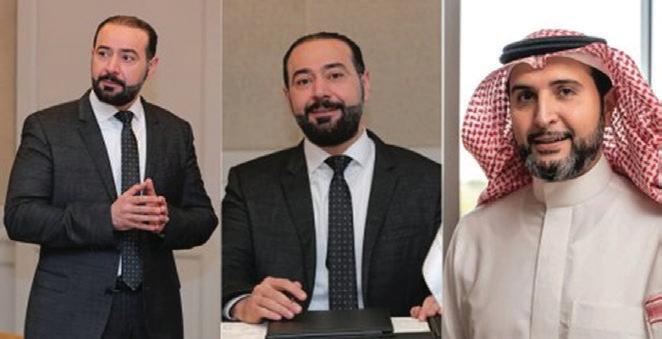
BEEAH Tandeef, the waste collection and city cleaning vertical of BEEAH Group, the region’s leading sustainability and digitalisation pioneer, announces a monumental step towards cleaner urban environments with AI City Vision.
This groundbreaking AI 360 Camera system for waste collection vehicles, the first of its kind in the region, is set to revolutionise how cities are maintained and waste is managed. A standout innovation, AI City Vision
processes images and videos captured by 360-degree external cameras with exceptional accuracy. By recognizing conditions such as waste bin status, overflowing waste, and road cleanliness, this AI-driven technology streamlines waste management, leading to significant time savings and smarter asset management. Overflowing bins are logged into a portal, optimising waste collection and cleansing routes. Focusing on the beautification and upkeep of the city, the AI City Vision
aim to provide innovative and reliable security technologies that meet the requirements of businesses, government entities, and critical infrastructure in the region".
system aligns perfectly with BEEAH Tandeef's dedication to a cleaner and more sustainable future in the UAE and beyond. This integration with existing waste management systems demonstrates a significant stride towards cleaner cities, fostering a sustainable and circular economy.
Khaled Al Huraimel, Group CEO of BEEAH Group, expressed: “For years, BEEAH Tandeef has demonstrated a tradition of innovation that sets it apart as an industry leader. Our unwavering commitment to research and development has driven transformative initiatives in waste management practices, ranging from pioneering waste segregation methods to implementing sophisticated recycling technologies. BEEAH Tandeef's consistent drive for innovation has earned it the reputation as the most innovative waste management company in the UAE and the region. We are fully committed to aligning our solutions with the UAE's sustainability roadmap, fostering a cleaner environment, and driving economic prosperity through technological excellence”.

F5 has reinforced its relationship with Google Cloud in Qatar, enabling organisations across the region to access 45 key solutions via Google Cloud Marketplace.
Businesses in Qatar, and the surrounding region, can now access a wide-ranging suite of services to secure, optimise and deliver apps and APIs – irrespective of deployment environment.
Notable solutions include F5 Distributed Cloud Services (F5 XC), FeatureMind, a leading provider of digital solutions within the retail environment, today announced that Onur Tepeli has joined the company as Chief Executive Officer (CEO).
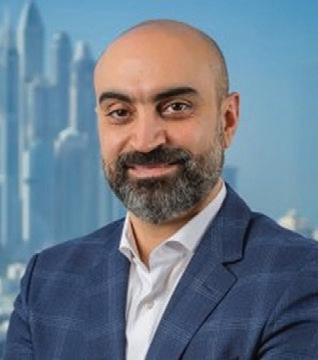
which are SaaS-based security, networking, and application management services that enable customers to deploy, secure, and operate their applications in a cloudnative environment wherever needed: the data centre, multi-cloud, or the network or enterprise edge.
“We are delighted to have such a strong presence on Google Cloud Marketplace”, said Mohammed Abukhater, RVP for Middle East, Türkiye, and Africa Sales at F5. “With the launch of Google Cloud’s new data center in Doha, more organisations
than ever before can deliver extraordinary digital experiences for their customers. Today, you don’t have to choose between legacy and modern apps. Or between on-premises data centres and cloud or edge locations. There’s also no need to compromise on either app performance or security. Thanks to F5 and our partner network, organisations across the region will gain new levels of freedom and security to scale and innovate. In Qatar itself, this will help to fuel the ongoing success of Qatar National Vision 2030”.
In this role, Onur will develop and execute a growth-oriented strategy that will help to build on the company’s presence in the region, leading the FeatureMind team based out of the Middle East, Turkey and Nigeria and supporting the growth of partnerships with Salesforce, Mulesoft, Akeneo and other leading providers.
As CEO, Onur will work to support the continued growth of the

businesses, adding momentum to the region and scaling the team. He will prioritise innovation, imagination and excellence in implementation that bring value to FeatureMind’s clients as customers’ businesses and operational needs shift, streamlining complex requirements.
Onur Tepeli, Chief Executive Officer at FeatureMind, said:
“FeatureMind brings together all the components of what is required and appreciated in this industry from world leading middleware through Order Management, Content Management, Product Information Management and
innovative In Store solutions. Acting as a leader of change in end-to-end omnichannel support and management, FeatureMind is well-positioned to help customers address some of the biggest challenges and complexities that clients face today, as the march to enhanced customer experience journeys continues at pace. I am looking forward to working with this highly talented team”.
Onur Tepeli, newly appointed Chief Executive Officer, FeatureMind.
CNME Editor Mark Forker secured an exclusive interview with Sudhir Chadaga, Chief Strategy Officer at Motorola Mobility, to find out how the company has been able to turn its fortunes around, its entry into the B2B marketplace – and the success of its ThinkShield product line.
Sudhir Chadaga is one of the most respected IT leaders in the industry. He has enjoyed a stellar and decorated career, which started back in 2000 with Hewlett-Packard.
In the two decades that have passed, Chadaga has held senior positions with Deutsche Bank, General Motors and Lenovo.
In 2016, he was appointed as the Global Head of Strategy, Restructuring & Transformation at Motorola, and is currently the Chief Strategy Officer at the smartphone behemoth, who was acquired by Lenovo in 2014.
In a candid exchange with CNME Editor Mark Forker, Chadaga outlined that despite being acquired by Google, and
then Lenovo, the company was still haemorrhaging money. Motorola simply had to change the way it conducted its business.
“We were losing a lot of money, so there was a concerted effort to turn the business around and fix it. We started to shut-down some product lines, and we exited some unprofitable markets –

and really focused on what our core strengths were. We did a lot of business rationalisation and through that we really concentrated on making sure the business could run at a stable level profitably. We got to that point around 2019, and since then we have been attempting to re-enter markets, and introduce new lines of product. Our strategy has been successful because for the last 12 quarters we’ve been running the global business profitably,” said Chadaga.
Chadaga has been a key figure in Motorola’s renaissance, but as the old saying goes, the more things change the more they stay the same, and that is certainly the case when it comes to Motorola’s market presence in Latin America.
“We are pretty dominant in Latin America. Overall, we have around a 21% market share. There are certain markets where we are much bigger. In Argentina, we have a 40% share, and in Brazil and Mexico we have a share of 30% and 25% respectively. That’s been a core marketplace for us, and we’ve been continuing to grow there. But Latin America has always been Motorola’s biggest market,” said Chadaga.
The Chief Strategy Officer said that Motorola’s market share in North America is 10% - and the company is firmly established as the No.3 player in North America, after Apple and Samsung.
Europe was a marketplace in which Motorola exited a number of years ago because it became an unprofitable market for them, but they are making
a comeback – and are also focusing on the Middle East and Asia.
“We have started to slowly focus on Europe. We play in the Western Europe markets now, and we are also in a few Eastern Europe markets too, so we’ve been very selective. However, we’re enjoying growth, so it’s been very positive. In the Middle East, we had shrunk our presence quite a bit, but we are seeing significant growth yearon-year across the region, over the last 12 months we grew by 22%, and it is growing rapidly. In Asia, our primary focus is India, Japan and Australia, and we’re selectively looking at opportunities in South Korea. We were pretty big in India at one point. We were close to 10% in the overall Indian market, so that is a big focus area for us moving forward. We’re being cautious, we don’t want to go back to those days where we had a lot of volume, but lost a
lot of money, so we are taking a cautious approach, but we are encouraged by the growth,” said Chadaga.
The fact that Motorola has now enjoyed growth for a staggering 12 consecutive quarters, has enabled the company to start making investments in a number of different areas.
As Chadaga points out, they are increasing their investments in the premium space.
“We are investing in premium products. We just announced our new Razor product, and last year we launched our Edge product. We are seeing a lot of momentum globally with our premium business growing by 75% year-on-year. We’re also doing a lot of innovation in terms of experiences on our devices and software capabilities. In addition to this, we are also opening up new markets to support regions in a bid to increase our footprint. Today, our products reach about 85 countries, but we’re looking to grow and expand that number. A very important focus for us has been on building the brand. We want to make people aware that we are still a very credible brand, and that we are back in the premium marketplace,” said Chadaga.
Traditionally, Motorola has never participated in the B2B space, but as Chadaga reveals the company is now firmly focused on B2B.
“B2B is an area that we identified as an opportunity for us to get into a few years ago. There are a few reasons for that, and one is the fact
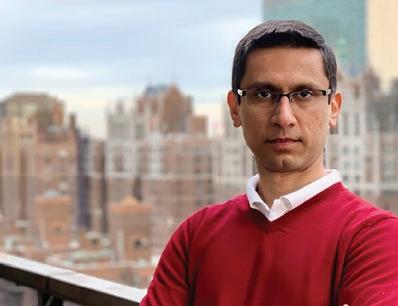
Our strategy has been successful because for the last 12 quarters we’ve been running the global business profitably.”
that it is a large market that we historically had been out of, we never participated in B2B. It was all reactive, we might have a customer come to us and ask us to sell them devices, but we never had a proactive strategy, but that has all changed now. We started in Europe, that’s the first B2B market we entered, and we are now operating the enterprise business globally,” said Chadaga.
Chadaga said that a combination of being under the umbrella of Lenovo, and considering their expertise in B2B, it made sense for Motorola to enter the B2B market.
“One of the key factors for us from a B2B perspective is the fact that we are part of the Lenovo family. Lenovo is a powerhouse when it comes to commercial enterprise B2B. For Motorola, it is very logic

for us to be part of that journey with Lenovo. It allows us to bring something different to the party, which is an entire ecosystem of products to the commercial space, whether that’s phones, tablets, or PCs,” said Chadaga.
Despite the competitive nature of the B2B marketplace, Chadaga was bullish in his belief that they can be successful, and made no secret of his ambitions.
“We have a bold ambition, we know the B2B space is competitive, and it’s dominated by Apple and Samsung, and other players that are participating in the B2B ecosystem. However, we have big aspirations, and we have a goal of being the clear No.3 player in the B2B space. We’re seeing a lot of traction, when we speak to global customers’ they like the Motorola brand,
it is respected globally. Our partnership with Lenovo adds not only a lot of credibility, but also the ability to go and execute,” said Chadaga.
ThinkShield has struck a chord with Motorola customers, and Chadaga explains why he believes it has resonated with so many end-users.
“What ThinkShield does is if your phone boots up, and has thrown an error, as an end-user you can have peace of mind that this phone is running in a secure manner. We take an absolutely zero trust approach to our devices, and we make sure that at every step we’re doing checks. That fine grain testing that we do really helps us build that security endto-end. We also keep adding
solutions go hand-in-hand with the way we want to solve problems for our customers. We want to take feedback from them and then build solutions that we know will help them overcome their challenges. Working with Lenovo is huge for us, they have the discipline and experience in execution, and we just need to learn from that discipline and execution, because working with commercial customers is a whole new ball game for us at Motorola. If I look at the market there are not too many others that can say we can bring you a smartphone, smartwatch, PC, tablet or server to the table, but Motorola can bring customers the entire ecosystem of products and solutions to
more to it from a security standpoint, there are so many new capabilities that we have added. We have a dedicated hardware chip in which we save passwords and keys. If something gets compromised, or corrupted in the main memory module nobody can steal your passwords from our phones because all of that is saved in a tamper proof separate location,” said Chadaga.
Chadaga believes that one of the key differentiators for Motorola is the fact they can leverage Lenovo’s expertise on execution to crack the B2B space.

“We want to deliver devices that have the innovation and the capabilities that customers want. Our end-to-end set of
the marketplace, and that certainly gives us a competitive advantage,” said Chadaga.
He concluded a brilliant conversation by highlighting his pride in the level of customer experience they can provide to their customers.
“One of the things that I really feel proud of is that we from a Motorola perspective are available to customers 24/7. That really differentiates us, we want to be there, and we want to be reachable for our customers, and we take great pride in being responsive to them. We have enjoyed great success of late, and we believe the building blocks are in place for us to continue to grow in all markets over the next 12 months,” said Chadaga.
One of the key factors for us from a B2B perspective is the fact that we are part of the Lenovo family.”

CNME Editor Mark Forker spoke to Fred Crehan, Area Vice President, Emerging Markets at Confluent, to find out how their business has been developing across the Middle East region – and how their technology is allowing their customers to manage their data more effectively.

In May 2022, Confluent established their regional HQ in Dubai, as they looked to expand their presence across the region.
At the time, I sat down with Fred Crehan, a respected IT leader that had been tasked with the responsibility of growing Confluent’s market share in the Middle East.
More than 12 months on from that conversation, I sat down with Crehan to get an update on Confluent’s progress over that time.
However, as Crehan pointed out the landscape has dramatically changed over the last year.
At the 2023 Kafka Summit, Confluent CEO Jay Kreps, said a combination of factors had created a perfect storm scenario.
Crehan highlighted how emerging technology trends coupled with a volatile macroeconomic situation globally, had placed increasing pressure on many businesses.
“I think it’s fair to say that it’s been a tough time for the software industry in general, but I’m really grateful to be part of the Confluent journey. We have seen emerging trends like AI, ML and digital transformation really come to
the fore, and what this means is essentially a lot of data generated and utilised. There is also increasing pressure on businesses given the macroeconomic environment to be more efficient, and those factors combined really drives the need for more solutions based on data in motion,” said Crehan.
Crehan conceded that Confluent hasn’t been immune to challenges over the last
year, but stressed they have still enjoyed growth due to the demand for their technologies.
“We’ve continued to be successful over the last 12 months. We’re making great progress with old and new customers, particularly in financial services, telecommunications and the software industry. Look, if I could remove the macroeconomic conditions then I would, but I can’t, and we’re
Kafka is at the heart of what Confluent does, and we see an increase in Kafka adoption across all types of markets and industry verticals.”
all subject to it. However, we’ve continued to grow, and we are continuing to provide value to our customers. There is a huge demand for our technology, and I believe that as long as that demand is there within the market, then we will continue to grow,” said Crehan.
Crehan declared that there is no shortage of data in the world, and referenced how the development of applications across so many industry verticals has led to an exponential increase in data.
However, as he pointed out the biggest challenge businesses have in the current climate is figuring out how do they get the right data, to the right people, at the right time to drive value.
“This is without doubt the biggest conundrum that enterprises face today. The companies that figure this
out, and do this really well are the ones that are driving a competitive advantage. A great example of that is Uber; they didn’t invent a new mode of transport, they just did it more conveniently than anyone else. If you can harness data better and quicker than anyone else then you’re going to have a competitive edge over your market rivals, and that’s exactly where Confluent fits in,” said Crehan.
Crehan says Confluent are able to help solve the challenges facing businesses in the digital economy because of its ability to link multiple applications together.

“We are the express highway that links two applications together, and makes the movement of data in real-time. We address the problem that companies are facing in the current climate by managing
all this data effectively, and that is allowing us to have a lot of success across our markets globally,” said Crehan.
Crehan outlined how that hiring and skills development were the No.1 priority of the CIOs, and CTOs that he has spoken to during his tenure at Confluent in the Middle East.
But he stressed that it is important to consider the fact that technology is not an end in itself, it is a means to an end.
“The technology that Confluent offers ultimate underlines a business process. We make that business process much shorter in time, and in some cases instantaneous. If we think about use-cases like fraud detection for banks, or financial services companies to detect fraud then it may take them 24 hours, but with Confluent that can take a matter of seconds. The real
value of the data in motion is shortening that business process. Like with any business process there are people involved, there are teams, and there are people that need to manage all of that. There are gaps in terms of skills, there’s no disputing that, and it’s very difficult to hire great people,” said Crehan.
The Area Vice President, Emerging Markets at Confluent said that the company helps to address this challenge for businesses by providing them with tools that automate the management of data in motion – and said they equip them with the solutions they need to scale much quicker.
“We offer a fully managed service which removes the people burden that you may have if you’re trying to run things by yourself, and allows you to scale much
quicker. Especially, when you’re talking about software companies that use a lot of Kafka, and a lot of data in motion. Those companies absolutely need to rely on software, automation, and fully managed services to help them scale. It drives better efficiency, and it lowers the cost of moving data. Efficiency is an equation between two
the highest standards, and that means our customers can have confidence that when choosing Confluent they are selecting a highly rigorous solution with regards to data privacy,” said Crehan.

Crehan concluded a brilliantly candid exchange by giving a summary on where Confluent is at in terms of market visibility across the
things, it’s generally a cost equation - and if you reduce cost and time, and increase revenue and value to customers then that’s technically more efficient, and that is what Confluent delivers. We help reduce infrastructure and storage costs, and we move data quicker than anybody else,” said Crehan.
Data privacy is a hot topic in the Middle East, and there’s been a lot of regulatory evolution across the region in terms of how companies and institutions manage data.
Crehan said the fact the company works with major companies in heavily-regulated industries gives them another key advantage over their market rivals.
“It is a topic we’re well versed in, and we are a global player in this space. We work with highly-regulated industries like telecommunications, and financial services and there are stringent requirements around the way in which data is being managed. We are certified to
GCC – revealed that he’s an extremely optimistic for what the future holds for the data in motion leader, and explained how Kafka is at the front and centre of everything Confluent does.
“My responsibility spans all the GCC countries and Israel, and I think there’s incredible opportunities throughout the region. There are some markets that are bigger than others in terms of population and GDP, but we see opportunity everywhere. Kafka is at the heart of what Confluent does, and we see an increase in Kafka adoption across all types of markets and industry verticals. We have customers all across the region and some of them are doing some really interesting things around data in motion, and we get excited and surprised around their creativity in terms of how they want to use the technology. We’re in a great place, and we’re excited for what the future holds for us at Confluent,” said Crehan.
There is a huge demand for our technology, and I believe that as long as that demand is there within the market, then we will continue to grow.”
CNME Editor Mark Forker spoke to Stefan Deiss, Co-Founder of the Hedera Hashgraph Association, to find out how their unique governance model has attracted some of the world’s biggest brands to develop innovative solutions on their blockchain network.

Stefan Deiss is a serial entrepreneur, and has enjoyed a decorated career in technology and telecommunications.
He spent 11 years at Orange Business Services, before moving on to work for Zurich.
In 2013, he founded his own consulting company, and over the last 10 years has enjoyed huge success.
Deiss is the co-founder of The Hashgraph Association, which was established in 2021.
The entity is an independent and non-profit organization focused on enabling start-ups, enterprises, and government
institutions around the world to develop enterprise-grade solutions on their Hedera Hashgraph network.
CNME managed to secure an exclusive interview with Deiss in an effort to learn more about the blockchain company.
As Deiss explained, Hedera is one of the leading decentralised open-source proof of stake public ledger frameworks in the marketplace, and is governed by some of the world’s leading organisations that form part of the Hedera governing council.
Some of those leading organisations include Boeing, Google and IBM.
“We established the Hashgraph Association back in 2021, out of Switzerland, in a bid to able to operate and launch various innovation programs focused on enabling enterprises, start-ups and government institutions to build enterprise solutions, and decentralise applications on the Hedera network. We then focused on how we put in place certain specific service delivery organisations that are able to address key areas of market. For example, we setup an institute focused on training, education, as well as certification, but we also
setup a ventures arm that is focused on co-investments in the projects that are going through the various innovation programs that are delivered by the Hashgraph Association as mandated by the Hedera governing council,” said Deiss.
Deiss highlighted how they are on a mission to enable and empower start-ups, enterprises and government entities to build solutions on their network.
“There’s a much broader context in terms of what we are doing - and the ventures building operation is really focused on co-investors to participate in the investments taking place in Hedera powered projects, which is why we have decided to setup an innovation fund in Abu Dhabi, with $100M to enable enterprises and coinvestors to participate in that fund,” said Deiss.
There is a growing demand in terms of decentralised applications globally, and Deiss explained how Hedera leverage their expertise to empower businesses to build the solutions they want to build using blockchain technology.
“We have identified that enterprises, start-ups, and government entities need and want to build their solutions leveraging blockchain, or DLT type frameworks. What we do through the innovation programs is assist them as they go through that journey of transformation to build on the Hedera network. One of the programs we have is focused on different types of projects across multiple different industries. We have a 3-stage innovation program,
so if a government institution, or enterprise wants to build something on the Hedera network then what we do is take them through the 3-stages of innovation to begin with,” said Deiss.
Deiss said that their program structure is simple, and follows four key principles, which are; discover, design, develop and deploy.
“We initially begin with a learning discovery session in which we try to determine and understand what exactly they want to build. We do some ideation and mutual discovery workshops, and out of that first stage we have a good understanding of what they want to build. We then move into the second stage, which consists of visualisation, which is effectively a proofof-concept development designed to help them have a visualisation of what exactly it is they want to build before we move into the third stage. The third stage is where we build the product, we provide them with engineering support, the
technical expertise, but also the business acumen that is needed. As projects go through those 3-stages of innovation, they are receiving all the different elements to be able to not only build the technical solution, but to be able to productise it and monetise it when they exit the innovation program,” said Deiss.
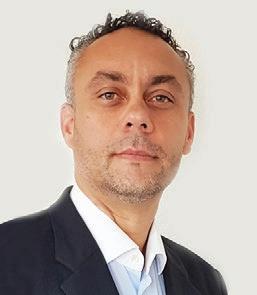
Deiss added that the innovation program typically takes between 6-12 months depending on the complexity of each project, and what exactly the businesses want, or need to build.
He also outlined that those looking at investing into startups exiting the innovation program, are given great confidence by the fact that all companies are subject to a robust due diligence process.
“Initially, start-ups get up to $250,000 of grant funding from the Hashgraph association, enterprises receive up to $750,000, and government institutions up to $1.5m. If you take that start-up as an example, once they have exited the innovation program, they have gone through due diligence, and a venture building type of structuring of the project, and they now have a product that is being developed and is ready to go to the market. This really provides a fantastic opportunity for coinvestors to engage with these projects at a very early stage, once they are ready to scale, and enter the marketplace.
In addition to this, we also perform a KYC check to ensure that any projects that we are onboarding have gone through some type of sanity check, as
I think one of the key differentiators and advantages we have is the fact that we have that governing council structure.”
well as reputational check to ensure that co-investors are not being damaged by some shady projects. The fact that all exiting the innovation program are subject to rigorous due diligence gives investors comfort and confidence,” said Deiss.
When asked what role multinational players like Google, IBM and Standard Bank play on the Hedera governing council, Deiss explained the nuances of the governance frameworks.

“Google, and the other governing council members all operate a node of the Hedera network, which basically means they are part of the verification transactions on the network. They play a pivotal role in the governance of the Hedera network, the consensus, as well as operating a node that validates transactions. Secondly, they are also responsible for the treasury, so essentially how the Hedera treasury is being managed in terms of grant allocations, providing funding for various types of projects, and being able to oversee the software development policies, and regulations around the Hedera network. The governing council members like Google, IBM, Standard Bank and so on, all have that type of governance role within the Hedera governing council,” said Deiss.
The FTX scandal rocked investor confidence in cryptocurrency, and the industry took a nosedive.
The SEC in the United States, has also cracked down strongly on it, but what makes Hedera so different is the rock-solid credibility it provides with its unique governance model.
“If you look at the examples of FTX, and various other collapses in the cryptocurrency market, it’s all about credibility. If these companies are willing to put their logo, and brand in association with Hedera then it does provide credibility, but not only that, it also assures and provides assurance that there is a governance model in place, which many other competing blockchain/DRT frameworks don’t really have. I think one of the key differentiators and advantages we have is the fact that we have that governing council structure. In addition to this, from an ESG perspective, it’s one of the protocols out there with the lowest carbon footprint, and these are two very important elements that are critical to when it comes
to enterprises, as well as governments that want to build on the Hedera network,” said Deiss.
Deiss concluded a wonderful conversation by outlining the relationship between the Hashgraph Association and Abu Dhabi Global Market (ADGM).
He said the collaborative approach is designed to enable and empower businesses to build unique solutions on the Hedera network.
“We’re not just providing the technology, but we’re also providing funding to get businesses started. The collaboration is very much focused, not only on the enablement of local start-ups and enterprises developing solutions on the Hedera network, but also very much looking at it from a legal and regulatory perspective. We know a number of these different projects all want to build very innovative solutions, but in many cases, they are stifled by the legal and regulatory uncertainty. We want to engage with regulators, we do the same thing in India, and in Switzerland, we want to help and contribute to the shaping of the regulatory framework by bringing in those use-cases in close consultation with the regulators, so that these projects are not building something that is illegal, or breaching regulatory norms in a given jurisdiction. Like in any business there has to be an economic incentive as well, so through that collaboration if we are able to generate economic benefits for ADGM, and the ecosystem, then that’s a winwin for both,” said Deiss.
We have identified that enterprises, startups, and government entities need and want to build their solutions leveraging blockchain, or DLT type frameworks.”
16th OCTOBER 2023
Habtoor Palace Dubai, LXR Hotels & Resorts
The Future Enterprise Awards is undoubtedly the flagship awards ceremony in the IT industry in the Middle East.

Hosted by CPI Media Group and tahawultech.com, the awards are the most prestigious in the IT industry both here in the UAE, and indeed across the Middle East.
The awards are set against the backdrop of GITEX Technology Week, which is the region’s flagship IT conference held at Dubai World Trade Centre.
#FutureEnterpriseAwards2023 #tahawultech
For more details about the event and nomination, please visit www.tahawultech.com/futureenterpriseawards/2023/
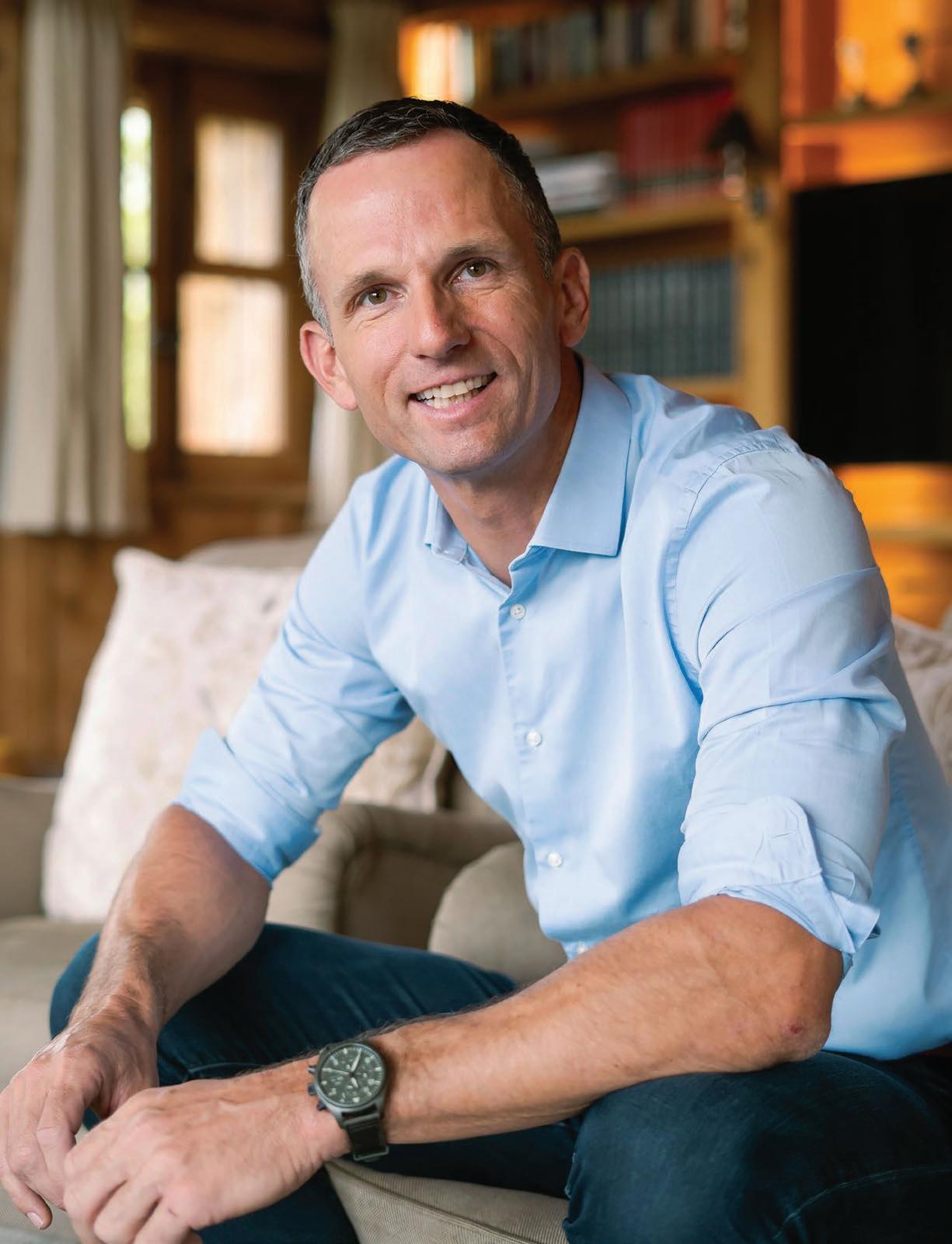
David von Rosen-Von Hoewel is wellversed in the art of start-up companies.
In a stellar career, he has established global businesses from scratch such as his fashion label VONROSEN and online gaming platform Lottoland.
The German-native is also a serial investor with a keen interest in technology designed to disrupt the status quo.
Hoewel is based in Dubai, and he believes the city has all the components required to become the new global hotspot for start-ups and aspiring entrepreneurs.
“I think in order to become a very successful entrepreneurial hub you need capital and talent, and I think Dubai has both in abundance. I feel there is a high-risk appetite across Dubai. Entrepreneurs that have invested in early-stage companies want to grow fast, and have a real desire and motivation to make money and succeed. There are a lot of venture capitalists in Dubai, and I think more and more money is going to pour in,” said von Rosen.
He said the real jewel in Dubai’s blossoming start-up landscape is the ‘talent’ that exists in the region.
“I think the most important component in Dubai’s booming start-up ecosystem is the talent that is in the region. There are so many people across the city that have that energy, will, hunger and optimism to create a business. I don’t see that energy and motivation anywhere else in the world.
It’s such a thriving space, and everyone you speak to has an idea and wants to create something. The innovation is palpable, and this is exactly the type of environment in which great companies are built,” said von Rosen.
There still remains the perception that the place to be in terms of building a new company is to be in the United States, or Europe, but the Lottoland CEO believes that will soon become a thing of the past.
“I think it’s only a matter of time before the US views Dubai
as the best place in the world to do business. We’re moving two of our companies to Dubai because there is so many young well-educated people who are hungry for work, hungry for success, and it’s the perfect recipe to build new businesses. In summary, the combination of talent and capital is driving the start-up ecosystem in Dubai, but another key factor is the regulation environment that it is in place, there are very low barriers of entry, low tax, which makes it easy to start a company online – and that’s a great ecosystem to innovate and launch new businesses,” said von Rosen.
He also pointed out that inflated salaries in the United States, and the focus on lifestyle in Europe, has also helped boost Dubai’s ambition to be the start-up capital of the world.
“In the US, and especially in Silicon Valley salaries have grown exponentially. Dubai is not a cheap city either, but you can hire young people with a rock-solid University education for much less than you’d do on the West coast. I think in relation to Europe, I just find this shift, which has
I detest monopolies, and I think they are wrong for an economy.”
been driven by COVID towards lifestyle has accelerated, and you might argue that it is a good thing for the individual, but for the economy it is not. I just think that sort of attitude, which again you can argue is good for the individual, doesn’t lend itself well towards building start-ups, there are less hard-working people, whereas in Dubai, the people that are there are hungry to succeed and are motivated to be successful. If you’re starting a business you need to be willing to make sacrifices, and find the right talent that is willing to do the same. I just think in Europe, people are working less and less,” said von Rosen.
When asked when he thinks we’ll see US companies making the jump to Dubai, von Rosen is
predicting that it’ll happen in the next 3-5 years.
“I think it’s only a matter of time, the barrier preventing it now is simply the geographical distance between America and Dubai. However, I think that in the next 3-5 years you’ll see a trend of American start-ups coming to the UAE to establish their operations. The US is such a big market in itself too, and that’s also a factor, but I do believe it’ll be a self-fulfilling prophecy once you have more and more of these unicorns coming out of Dubai. The exact same thing happened in the Valley, they had one or two unicorns, then it just spiralled and became the startup ecosystem of the world. I believe there will be a couple of big unicorns that will emerge
from Dubai and that will really, really challenge the location of the Valley, and the challenge the position the United States has on international entrepreneurship,” said von Rosen.
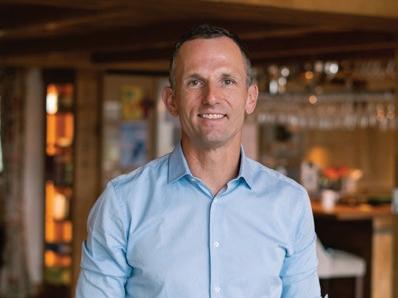

The focus of the interview then shifted to Lottoland, which is now 10 years old.
The company has enjoyed phenomenal success, and Hoewel explained the mission statement of Lottoland.
“It’s been 10 incredible years,
and at the very beginning it was just a handful of my close friends that started on the company. The idea and concept of the company is to globalise and internationalise the lottery. I was a lottery player back then, and I really love that idea of waking up one morning as a millionaire. It gives people the ability to dream, and that’s a powerful thing. I know the math, and I know the odds, but if you don’t buy a ticket then you have a zero chance of winning and becoming a millionaire, but if you have a ticket then you have a small chance of winning - and that enables you to dream and that’s why I started the company,” said von Rosen.
They say that in life, it’s all about timing, and von Rosen
conceded that the timing of Lottoland’s entry into the gaming marketplace was perfect.
“We were lucky in terms of where we started and how we started, and I think we just hit a nerve. There was a huge wave just before us in relation to online gambling. Before the introduction of the lottery online, it was essentially sports’ betting and online casinos – and it was predominantly dominated by British and Irish companies, which made it a big marketplace in Europe. However, none of them were offering online lottery, so we identified a gap in the market, and that’s where we came in,” said von Rosen.
Another motivating factor was the fact that the lottery until Lottoland entered the market was a complete monopoly.
“I detest monopolies, and I think they are wrong for
had phenomenal success in Australia, and the last market we penetrated was the US, which has now become our fastest growing market,” said von Rosen.

Von Rosen also disclosed that he has another couple of other online gambling companies.
“We’re on the path to make $1bn in revenue for this year, and it’s been very profitable for us. What I’m extremely proud of is the fact that we never took in any venture capital, it was all bootstrapped. We were profitable from the first day we went live – and I was always very cost aware. I would fight for every penny, and that made us quite profitably very quickly,” said von Rosen.
As aforementioned above von Rosen is also a serial investor, but unlike other angel investors, he typically only does majority investments.
“I don’t like minority investment, I’ve done it in the past, but I’ll only do it if
an economy. I like a good challenge, and it was the last standing monopoly in many countries, and even today, in some cases it still is. For me, a monopoly hinders innovation, because when you are the monopolist then you don’t need to innovate, you can lean back, and it hinders growth, so it effects the economy. We moved to Gibraltar and internationalised the company from continental Europe, and we expanded into the UK, Ireland and Africa. We
something specifically interests me, and there’s no other way to do it. Usually our group takes 50%+ and then I put all my weight behind it in terms of money, connections, network, and time to try and make it grow. I love tech, but I am also very interested in mobility. Anything that transports humans and goods in a faster and more efficient way excites me. I like disruptors that have broad shoulders and really disrupt the status quo,” concluded von Rosen.
I think it’s only a matter of time before the US views Dubai as the best place in the world to do business.”

Mohammed Al Kaff Al Hashmi, Co-founder of Islamic Coin, spoke to CNME Editor Mark Forker, to explain the mission statement of the crypto company, what differentiates the company from other market players – and the innovation and philanthropy it is driving for the Islamic Community and humanity.
Mohammed Al Kaff Al Hashmi is one of the most respected technologists and engineers in the Middle East IT ecosystem. With a remarkable career spanning two decades, he has attained remarkable success and made significant strides in various ventures. Commencing his professional journey with the esteemed global telecommunications vendor Huawei, he swiftly ascended to the role of CEO at Netaq for E-Solutions. Demonstrating his exceptional entrepreneurial acumen, he went on to found MCPM MENA, co-found MCPM Holdings, and establish UI Ventures, cementing his reputation as a visionary leader with a wealth of expertise and accomplishments.
However, in 2021, he co-founded Islamic Coin along with Andrey Kuznetsov, Alex Malkov and Hussein Mohammed Al Meeza.
Islamic Coin has been branded as a purposeful community crypto asset.
It’s used as a native coin on the HAQQ blockchain – and each time a new Islamic Coin is minted, 10% of the issued amount is deposited into a special Evergreen DAO for further support into projects that are beneficiary for the community, or given to charities.
Islamic Coin is the first introduction of a coin that brings direct economic value to a community.
CNME managed to secure an exclusive interview with Al Hashmi in an effort to better understand the concept being proposed by Islamic Coin and what makes the project so
unique in comparison to other cryptocurrency players in the marketplace.
Al Hashmi began the conversation by outlining what the mission statement of the company is and how it has been designed to preserve and protect the values of the Islamic finance.
“A better starting point would be to provide a clearer understanding of the intricacies of Sharia finance. Sharia finance is the only financial system that actually cares about ethics and values and has them embedded in its principles. But, what exactly are these principles? Sharia principles revolve around the community, so Sharia finance is a community-first system. In Sharia finance, the charging of interest is eliminated, and this is designed to protect the community. It simply does not make sense to burden individuals who are already in a financially vulnerable position and seeking assistance with interest charges when they are reaching out for help,” said Al Hashmi.
As Al Hashmi pointed out that type of financial system creates inequality and reflects negatively on the community and fundamentally goes against its principles.
He pointed out the impact of blockchain for promoting greater financial transparency.
“Traditional financial players’ approach often creates inequality, but our
Sharia finance is the only financial system that actually cares about ethics and values and has them embedded in its principles.”
approach is guided by a set of values centered around ethics. Their metrics are driven by numbers and profits, and this is what makes Sharia finance distinct. When considering the technology best suited for implementing our Sharia finance model, blockchain emerges as the best choice. You may ask, why blockchain? There are multiple reasons: it's reliable, decentralized, traceable, and governed by the community, which ensures a high level of transparency. Furthermore, with the advent of smart contracts, we are able to conduct transactions and dealings that are defined by Sharia finance with utmost efficiency and effectiveness,” said Al Hashmi.
Al Hashmi reinforced his view that the mission statement of Islamic Coin is to better serve the Islamic community, who he feels are underserved.
“In response to inquiries about why we are pursuing this project, we have a community of 1.8 billion Muslims all over the world, alongside many non-Muslims who adopt ESG and Sharia finance principles. Considering the diverse range of products and the substantial size of our community, we are presented with a remarkable marketplace valued at $7 trillion in total, with $3 trillion representing the Islamic finance and $4 trillion accounting for Halal products. Recognizing that our community has long been underserved, we are committed to rectifying this imbalance, and we believe that the best way to achieve this is through leveraging the power of blockchain, crypto and smart contracts,” said Al Hashmi.
Technological innovation and philanthropy are key components of the Islamic Coin model, and Al Hashmi went into more detail on the capabilities the HAQQ blockchain platform sits on top of.
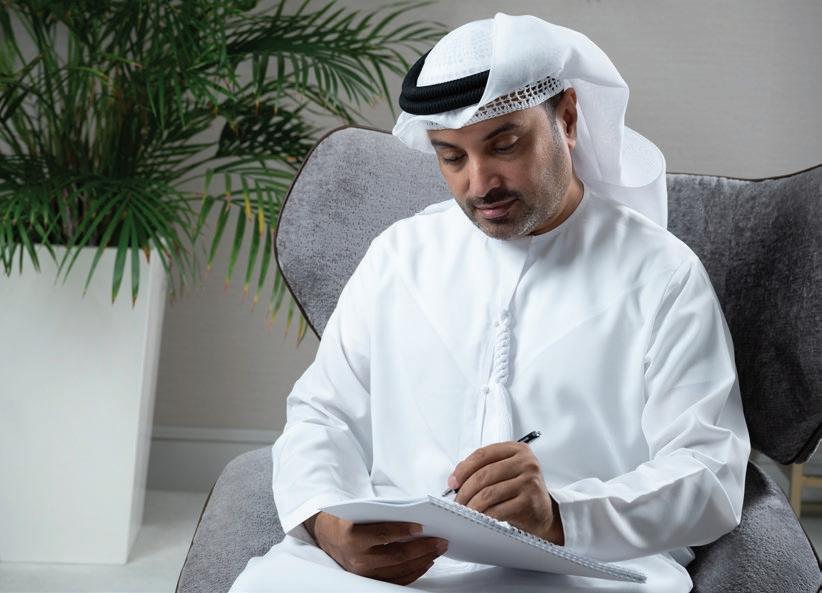
“HAQQ blockchain utilizes a Proof-of-Stake consensus mechanism, and is compliant with Sharia finance. Its foremost value proposition lies in being a clean platform. If you prioritize ethics and values and adhere to Islamic finance practices, you will find HAQQ to be the ideal hosting platform for your project. Choosing any other blockchain, you may find a variety of good projects spanning diverse sectors such as business, health, or education, but you may also find gambling
and casino projects. Such an environment is not conducive to fostering ethical projects,” said Al Hashmi.
Al Hashmi highlighted the role played by its Sharia Oracle technology and how it drives philanthropy for the Islamic Community.
“We have developed a cutting-edge technology known as Sharia Oracle which helps to keep the HAQQ blockchain a clean platform. As a decentralized blockchain, you can deploy any project on the blockchain, but if you want to gain the community's trust and get labeled as Shariacompliant, you have the option to apply for Sharia Oracle. The process consists of two phases: community approval and Sharia
Recognizing that our community has long been underserved, we are committed to rectifying this imbalance, and we believe that the best way to achieve this is through leveraging the power of blockchain, crypto and smart contracts.”
board approval; successfully passing both phases results in your project being labeled as Sharia-compliant. Now going a little bit further, the philanthropic part of this. 10% of every minted coin is allocated to the Evergreen DAO. Evergreen DAO will be used to support the projects of the community and make contributions to charities, education, and important research. So, it’s a win-win situation for everyone involved. We are empowering the community, but at the same time we remain committed to supporting our ethical values, giving back to every sector within the Muslim community,” said Al Hashmi.
Al Hashmi then switched focus to the cultural shift that had taken place, which has resulted in a surging demand for Islamic compliant crypto products – and ultimately what makes them different from other crypto companies.

“First of all, when discussing the current cultural shift, I find the term 'cultural shift' fitting because it highlights a departure from the traditional financial culture that primarily focuses on numbers rather than community. As mentioned earlier, what sets us apart from other projects and financial institutions is our genuine concern for the community and our vision which is deeply rooted in philanthropy and giving back. From a business standpoint, we have a niche market, a huge community and a large market cap. We've never seen any Islamic financial entity file for bankruptcy. It's a highpotential marketplace that we operate in, with a minimum of
20% growth each year,” said Al Hashmi.
One other key differentiator for Islamic Coin is the move away from centralisation to decentralisation.
“What also differentiates us from other players in the crypto space is our focus on not just Sharia finance and halal products, but on the entire lifestyle of Muslims, seamlessly integrating it with web3 technology that offers transparency and reliability. With a steadfast focus on making Muslims’ lives better, we’re developing projects that address Muslims’ social needs and simplify their day-to-day tasks, improving the quality of their lives,” said Al Hashmi.
He concluded a wonderful conversation by again highlighting the impact its Evergreen DAO is having on the Islamic community.
“As I said, 10% of every minted coin goes to Evergreen DAO, and that DAO will support
the community’s projects across all industries. It provides greater transparency as well, so all the stakeholders within the community are able to see how the capital is being reinvested into the Islamic community.
It’s also important to outline that none of the co-founders of Islamic Coin have any control, say, or influence over what projects to be supported by Evergreen DAO. We maintain a neutral stance, and the governance of this initiative rests solely in the hands of the community. Every project is voted on, so there is a full democratic process in place. If a specific project receives sufficient votes for funding, it then proceeds to the Sharia board for evaluation, and if it is ratified then it gets the grant. The co-founders have no influence over this decisionmaking process, it is driven by the community for the greater good of the community,” said Al Hashmi.
We have developed a cutting-edge technology known as Sharia Oracle which helps to keep the HAQQ blockchain a clean platform.”
CNME Editor Mark Forker spoke to Virgin Mobile UAE’s Managing Director Rob Beswick , to find out what differentiates the Gen Z service provider from other operators, the need for seamless experiences - and its partnership with The Entertainer application.
You were promoted to the role of Managing Director at Virgin Mobile UAE in June 2020. Over the last 3 years, Virgin Mobile has solidified its position as the 'go-to' brand for Gen Z. What is it about the services you provide that differentiates you from other service providers? Virgin Mobile UAE believes in a
digital-first strategy. By focusing our teams on being digital it provides the right focus, and ensures that we create a platform to simplify and improve the customer experience We knew that this was the space in the market that needed filling for customers who want simplicity and demand a great product experience.
We constantly work hard to make the mobile experience better. The customer-first approach is our North Star and the team is always looking for solutions that can solve mobile customers’ pain points, deliver above their needs and build loyalty.
We have built an operating and business model that is truly digital and this is a key competitive advantage for us. It is designed to meet our customers evolving needs with incremental and regular improvements through our agile product development capabilities.

The model allows us to consistently deliver new features and products to our customers, all of which can be easily accessed through the app. This keeps it relevant, fresh and innovative for our young at heart and Gen Z customers and allows us to constantly iterate to meet customer needs
We view our app as the product as it’s the control that allows the customer to fulfil all their telecommunication needs seamlessly on their phone.
This digital-first experience has become a core differentiator for us in the market.
We were the first telco brand in the market to offer a 100% app-mandatory experience.
You can choose a plan online and get your SIM card delivered to you within 60 minutes, you can port your number seamlessly, boost your minutes or data, pause your plan when you travel and upgrade or downgrade your plan based on what you need, this flexibility is key and digital is the platform that provides it.
We were also the first telco brand to introduce services and features that are now considered industry standards, like our subscription-based model where you can choose a monthly plan or opt for an annual plan pay upfront and save 50% on your mobile bill. This is all based on valuable insights that our customers have given us, which shows that our tech savvy customers need simplicity, flexibility, value, and extraordinary experiences. This approach to make mobile better has allowed us to capture not just the Gen Z but also customer segments who are looking for something better from their provider – the early adopters, young at heart and the tech-savvy.
We know that the population in the UAE is shifting dramatically to a much younger, tech-savvy demographic. How has Virgin Mobile UAE been able to adapt and evolve their operations and services to meet the evolving expectations of their customers in terms of their internet needs?
Given the strong digital hub that the UAE has developed and continues to invest in, the new, younger, tech-savy population of the country is in the right place at the right time. We now live in an era where most people can work remotely and from anywhere. Connectivity drives this remote culture, and ubiquitous 24/7 connectivity to the internet is paramount to facilitate the needs of these digital nomads. But customers need flexibility all the time, as well.
not be the best option for them.
This is where we take the feedback of customers: they want more flexible plans, and they want to get exactly what they’re signing up for.
Our solution is to offer a simple digital platform that puts them in control, providing flexible plans that allows them to select and pay only for what you need.
For example, some months, they may need more data because they are mobile and are working in different places, while other months, they may not need as much because they are at home and on Wi-Fi.
Or people travelling may need to pause their plan because of a spontaneous trip. With this remote but fully connected lifestyle, the traditional long-term contract and large bundle plans may
Customers are increasingly becoming more socially conscious about their carbon footprint and calculating their impact on the environment. As a company that is constantly evaluating its own impact on the planet, our app is designed with a digital carbon offsetting feature, which allows customers to contribute just AED 6 to offset their mobile plan’s carbon footprint for a year.
We then match every donation to make a positive difference to the people and the planet.
The younger generation also prefer to chat digitally over calling us, so we responded accordingly.
Our customer support team is now accessible through our inapp chat available 24/7, which means that we get provide the right support around the clock.
Our digital-first business model goes hand in hand with the way we respond to the evolving market. We believe in listening to and learning from our customers. It’s what drove us to be a leading digital-first
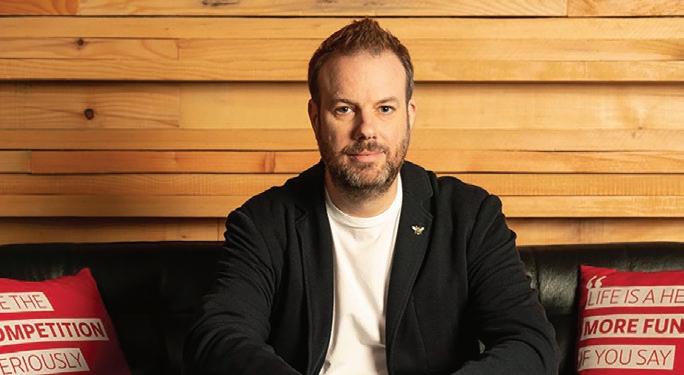
Virgin Mobile UAE believes in a digital-first strategy.”
business, and what motivates us to be flexible, allows us to pivot, and drives incremental improvement – Our customers respond well to this.
We live in the experience economy, and brands are acutely aware than failure to provide a seamless digital experience could be fatal, as consumers no longer have any tolerance for bad interactions with applications. What steps and measures do you follow to ensure you deliver that seamless experience to your end-users - and how important is it to give users the autonomy to shape their own experiences with Virgin Mobile?
We are a 24/7, 365 days service provider because customers expect to be connected and have a high-quality connection all the time. A seamless digital
experience is critical to our customers who want “On Demand” services.
They need and expect to be able to access their services anytime and anywhere, and it needs to blend effortlessly with their lifestyle and on their terms.
We work hard to make sure that we are always listening to our users’ feedback and implement them as effectively as we can. The Research Lab in our app is how we allow them to offer feedback so that we can keep our product up-to-date and upgrade it based on their preferences.
These insights also allow us to come up with attractive offers and an even better inapp user experience. We don’t always get it right, but we are confident that we are doing our best to make sure that we get it right 9 out of 10 times.

We A-B test new features
and this lets the customer decide how the experience is best delivered. This focus on collecting data points from real life rapid cycle testing means that our product team are able to shape the user experience based on what's really working and this differentiates and improves the digital experience on an ongoing basis.
A good example is when we noticed that some of our customers were buying data boosters more than once a month. We were able to identify this and recommend a more affordable and efficient monthly data plan to them instead – one where they don’t have to continuously buy added data boosters and therefore save money.
These small changes and recommendations to make their life better, simpler and give value back are a fundamental
part of our digital experience, and its made possible by continuously listening to our customers.
It’s great to be in a country that welcomes innovation and technology with open arms. The UAE’s leadership and strong regulatory environment has been a inspiration in our pursuit to create a seamless digital experience for users.
We remain committed to supporting the UAE's ambition to becoming a more digitalized nation.
National initiatives like the UAE Pass are being integrated into our services to reinforce the fully digital experience of Virgin Mobile as well as the UAE.
These initiatives prove that innovation in the public and private sector will continue to thrive under its visionary leadership.
Along with the rapid development of the UAE and technology, we too are paving the way as we go.
We work closely with our partners and regulatory bodies to bring about meaningful changes to the lives of people. In this collaborative journey within a digital-first business, we are learning all the time.
Our customers have more autonomy, which means we need to educate them so that they make informed decisions. For instance, when customers opt-in for auto-renewable plans, we tell them that it will renew automatically, and they can opt-out if needed before their plan renews.
We learned that being transparent and forthcoming
with information is critical to their digital experience. It reminds them that they are in full control of their experience with us.
These learnings are ours as much as those of the sector. We have an opportunity to define what a fully-digital business model looks like in the UAE.
Can you tell us a little bit more about the partnership between Virgin Mobile UAE and The Entertainer - and how significant is that collaboration?
This is a partnership that we’re very proud to kick off this year. When customers select a yearly plan of 7 GB+ from Virgin Mobile UAE, they get a free one-year subscription to
What are your primary goals and objectives for Virgin Mobile UAE for the remainder of 2023, and looking ahead to 2024?
2023 has been a very strong year for us so far, and I have my team to thank for that.
In the remainder of 2023 and looking ahead to the next year, we want to focus on doubling down on bringing more to our value and products to our customers.
Our focus on simplicity, flexibility, and great value will always drive us and and will continue to work hard to elevate this with new benefits, features and services.
We will remain focused on digital innovation. We want to continue bringing industry firsts and leverage technology
tailored ENTERTAINER offers.
They can access this right from the Virgin Mobile app so the experience is seamless.
The ENTERTAINER opens exciting adventures and hidden gems in the UAE, and it’s exactly what our audience wants whether they’re new to the country or have been a while.
In line with our goal to provide extraordinary experiences and always meet and exceed customer needs, we want to make sure we also contribute to their holistic life experiences, not just mobile. We are constantly looking for ways to expand our offerings and create better value for our customers. So watch this space.
to offer the best customer experience possible. This is not just about what we build but also making sure that we continue to improve our product and services regularly.
Lastly, we want to make sure that we continue to provide an extraordinary experience to our customers, our community, as well as our internal team.
Richard Branson’s philosophy of “Changing Business for Good” will always guide us, and we do this by supporting sustainable causes and investing in grassroot organizations. This helps us create extraordinary experiences to our surrounding community, while contributing to their overall wellbeing and the environment.
We have built an operating and business model that is truly digital and this is a key competitive advantage for us.”
CNME Editor Mark Forker spoke to Stephen Gill, Academic Head of the School of Mathematical and Computer Sciences, Heriot-Watt University in Dubai, to find out more on the investments made in 5G technology across the UAE, what impact the next-generation network will have on the country’s economic growth – and how digital transformation can propel the knowledge economy.
What are the expectations about the telecommunications sector’s contribution to the UAE’s GDP during the year 2023? What are your estimates of the size of the UAE's investments in 5G networks so far?
The telecommunications sector is a significant contributor to the UAE's GDP.
According to the Telecommunications Regulatory Authority of the UAE, the sector contributed 4.1% to the country's GDP in 2020, which amounted to approximately AED 41.6 billion.
As for the expectations about the sector's contribution to the UAE's GDP in 2023, it will depend on various factors such as economic conditions, market competition, technological advancements, and government policies.
However, forecasts and predictions point to an expected growth in the telecommunications industry, driven by the increasing demand for high-speed internet and mobile services, the growing adoption of digital technologies, and the development of new services and applications.

Regarding UAE’s investment in 5G, in 2021, it was announced that Abu Dhabi ranks among the fastest capitals globally in the 5G network index, with the fastest median download speeds (421.26Mbps) in the first half of 2021, according to data from Ookla, a global leader in fixed broadband and mobile network testing applications, data and analysis.
Additionally, the UAE is leading as the fastest fixed network in MEA [the Middle East and Africa] and fastest mobile network globally.
What is the impact of 5G networks on the economic sectors in the UAE in general and on digital transformation in particular? What are the fastest economic sectors to benefit from the 5G networks in the UAE?
The impact of 5G networks on the economic sectors in the UAE is expected to be significant.
With its high-speed data transfer capabilities, 5G networks can support digital transformation through advanced technologies such as augmented reality, virtual reality, and artificial intelligence, which can drive innovation and productivity across many sectors.
For example, in healthcare, 5G could support remote consultations and surgeries, and in manufacturing, it could enable the use of smart robots to improve efficiency and safety.
The UAE is leading as the fastest fixed network in MEA and fastest mobile network globally.”
Recently, the Dubai Chamber of Digital Economy announced that the UAE’s national digital economy is expected to surge from $38 billion today to $140 billion by 2031, as the Emirate successfully pursues its digital transformation journey, according to a new report.

The deployment of 5G networks is expected to play a pivotal role in this growth.
The availability of highspeed connectivity and advanced technologies supported by 5G could lead to the development of new digital products and services and the creation of new job opportunities.

How do you see the collaboration between ministries and organizations to achieve and consolidate the process of digital transformation to serve the knowledge economy in the UAE?
According to the Telecommunications and Digital Government Regulatory
Authority, the UAE’s digital economy contributes 4.3 per cent to the GDP, with expectations that this rate will significantly increase in the coming period.
The government of the UAE has taken several initiatives to achieve this through collaboration between ministries and organizations.
The UAE Smart Government initiative is a great example
of that, as it aims to provide seamless and integrated government services to citizens and businesses through digital channels.
The initiative requires collaboration between various government entities to develop and implement digital solutions.
Additionally, the Abu Dhabi Digital Authority (ADDA) supports digital transformation through strategies, policies, standards, and enterprise architecture for increased government performance.
ADDA enables governmentwide digital leadership through innovation programs and global and local partnerships.
Recently, the Abu Dhabi School of Government (ADSG) launched the Future Digital Leaders and Young Digital Leaders programmes in collaboration with ADDA.
This is a great example of the collaboration between government organisation to support digital transformation.

Our award winning family of IE switches just got better thanks to the IE220 Series
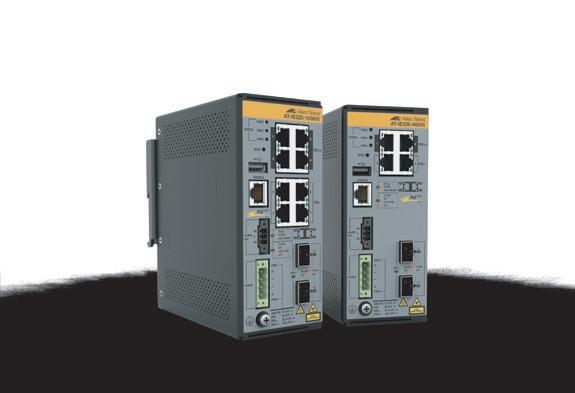
10 Gigabit uplink ports gives you the value and versatility your network requires. The ideal speed where high bandwidth backhauling and scalability is required. Coupled with IEEE 802.3bt PoE++ up to 95W to meet the demand for high power of devices connected to the network – this really is built for enduring performance in the harshest of environments, such as those found in outdoor installations. With rich functionality and advanced security features, our switches deliver the performance and reliability demanded by deployments in the age of the Internet of Things.
For more information, please contact one of our Allied Telesis Account Managers today.
Tel: +971 4 3522 433
Manish Bakshi, Managing Director, at BenQ Middle East has penned an exclusive op-ed that examines the rise of smart office solutions.
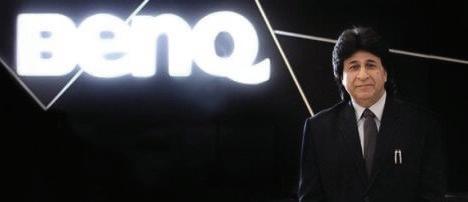
In the arena of modern business, the workspace has become much more than a physical location. It is an environment that fosters collaboration, creativity, and productivity.
This evolution has been driven by many factorstechnological advancements, changing workforce demographics, shifting work patterns, and the relentless pursuit of efficiency.
From the rigid, cubicledominated offices of the 1980s to the open floor plans that were popularised in the early 2000s, the design and function of the office have always mirrored the zeitgeist of its time.
Today, we stand on the cusp of another seismic shift in the
way we think about and utilise our workspaces.
This transformation is being fuelled by the rise of smart office solutions.
As we move further into the digital age, technology continues to reshape our lives in profound ways, and the workplace is not immune to this influence.
From the devices we use to the software that powers our projects, technology is embedded in almost every aspect of our work life. The current landscape of

workspaces reflects this integration.
With remote and flexible working becoming more commonplace, and organisations striving for agility and scalability, the traditional office setup is being challenged. The focus is shifting towards creating workspaces that are not just functional, but also flexible, connected, and conducive to collaboration.
The powerful benefits - improved productivity, enhanced collaboration,

As we move further into the digital age, technology continues to reshape our lives in profound ways, and the workplace is not immune to this influence.”

reduced operational costs, and a better work experiencemake these smart solutions an investment worth considering for businesses of all sizes.
In this new era, smart office solutions are emerging as the game-changers. By harnessing cutting-edge technologies, these solutions are transforming traditional workspaces into intelligent environments that adapt to the needs of their users.
Let's delve deeper into some of these transformative solutions:
Interactive displays, such as smart boards and touch screen monitors, are revolutionising the way teams collaborate. These devices allow team members to share ideas, annotate documents, and brainstorm in real-time, creating a more engaging and productive meeting culture.
The intuitive interfaces of these devices also mean that they are user-friendly, reducing the learning curve for new users. BenQ's RP03 series, for example, comprise of interactive screens with robust Dolby Digital Plus sound and eye protection.
BenQ Boards boast the incorporation of Intel's potent 10th Gen Core processors, a powerful technology paves the way for a transformative workspace experience.
The business projectors of today bear little resemblance to their predecessors.
These modern devices offer high-definition display,
wireless connectivity, and compatibility with a host of devices. No longer is a meeting just a presentation; it's an interactive session where everyone can contribute, making decision-making faster and more inclusive.
Business projectors have become an essential tool for delivering impactful presentations and facilitating effective communication within organisations.
With features like 3D projection and interactive functions, these projectors are turning ordinary presentations into immersive experiences, enhancing understanding and retention of information.
In an age where teams can be spread across different locations or even continents, video conferencing solutions have become a critical part of the modern workspace. These solutions save travel time and costs, enable real-time collaboration, and ensure that communication is not hampered by geographical distance.
High-definition video and audio, screen sharing, and recording functionality make these tools a powerful platform for team meetings, client presentations, and even recruitment interviews.
Smart broadcasting tools are enabling businesses to reach wider audiences through webinars, live presentations, and virtual events.
These tools offer features like live chat, analytics, and
integration with social media platforms, making them a potent tool for marketing, training, and customer engagement.
By providing real-time insights into viewer engagement and behaviour, these tools also allow businesses to measure the effectiveness of their broadcasts and make data-driven decisions.
Collaborative office solutions encompass a range of software and hardware designed to facilitate teamwork.
From project management tools that keep teams organised and aligned, to collaborative document editing software that allows multiple users to work on a document simultaneously - these solutions are empowering teams to work more efficiently. In addition, features like task tracking, real-time updates, and integration with other tools make these solutions an indispensable part of the modern workspace.
The rise of smart office solutions is a testament to the transformative power of technology. These solutions are not just enhancing productivity and collaboration; they are redefining what a workspace can be.
As we move forward, it's crucial for businesses to choose the right solutions that align with their specific needs and objectives. The goal is not just to create a 'smart' office but an office that works smartly, fostering a culture of innovation, efficiency, and continuous improvement.
CNME Editor Mark Forker spoke to Nicholas Watson , CEO and co-founder of Udrive, to find out how the car-sharing company is completely tr ansforming the mobility sector in the UAE – and its strategy to expand its model across the Middle East region.
Nicholas Watson has cultivated a stellar reputation for himself as a prominent business leader and entrepreneur over the last 20 years.
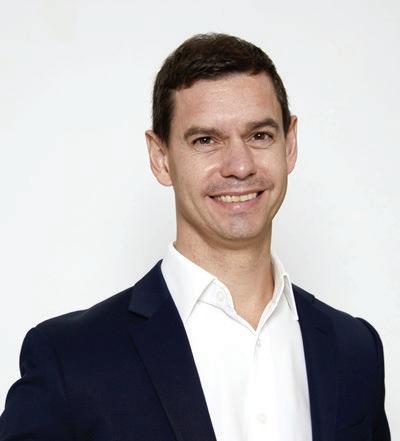
Watson is an expert in scaling companies in emerging technology verticals like mobility, FinTech and blockchain.
He spent 17 years at Naseba, a platform designed to help businesses navigate their way through emerging markets.
Watson is currently the CEO of Udrive, which is a car-sharing company he co-founded with Hasib Khan in 2017.
Over the last 3 years they have enjoyed phenomenal growth, and in a candid interview with CNME he documents their journey, their evolution as a company - and their plans for the future growth and scalability.
Watson began the conversation by highlighting his belief that mobility is a
fundamental human right.
“At Udrive, we believe that mobility is a human right. If you don’t have mobility then you can’t eat, you can’t drink, you can’t do anything, so if you think about it mobility creates these opportunities – and I think that’s where Udrive sits in its core ethos. The major problem with mobility is the fact that it is treated
as a ‘nice to have’ instead of a fundamental human right. However, I do think we have now reached this inflexion point where mature Western governments have recognised that they need to get mobility right,” said Watson.
We live in what many are describing as the ‘experience economy’ – and businesses who don’t deliver good experiences won’t survive.
I think it’s fair to say that in Dubai the ‘experience’ when dealing with car rental companies left a lot to be desired.
Interestingly, Udrive started out as a car-rental company, before pivoting towards the car-sharing model.
“We started out originally as a traditional rent-a-car company, in which you rented the car for a month, and customers put down a deposit of 1,000AED for any fines, or penalties so we can recover it if need be. However, there was also the element of checking
for damage and charging for damage, even if you weren’t responsible for it, but that’s part of the business model. Every car rental company makes more margins out of the damage than they do out of the rental itself, it’s embedded into their business model to go after your damages. We decided to flip the business, because even though we were profitable, we just weren’t scaling and were not becoming a household name. Our flip from traditional car rental was not just a technology play, it’s an operational play, and a business model play. We removed all the deposits, we included fuel and parking – and we removed all the things that people hated about car rental,” said Watson.
Under the founders’ vision,
Udrive decided to digitise their fleet of cars, harnessing the capabilities of IoT and cloud technology to make the cars communicate with each other.
“We essentially took a dumb asset, which is a car, that had no digital nature, and digitised it. Once we digitised the cars it opened up a whole host of opportunities for us. We can track where it is, where it is going, where the journey starts, where the journey ends, who opened the car, where did they take it. You can also secure the car by not having a key, the key is the biggest risk factor
primarily because anybody can hand a key to anybody. When you open our car, we know who owns the phone, who the account holder is,” said Watson.
Watson reinforced the importance of security and highlighted the robust security provided by the fleet of Udrive cars.
“Security is critical, but if you want to digitally transfer one key to another then you can do that instantaneously with our tech. However, all our cars are remotely opened, so you can’t get into the car. Now even if someone did break into the car

We have what we call a franchise agreement, and we have a special license which gives us the right to do something that nobody else can do.”
and took the key from inside the dashboard, they can’t start the car because it is completely immobilized,” said Watson.
In another example of their desire to deliver good experiences, Udrive has developed new technology which expedites the approval process involved in acquiring a car from the fleet provided by Udrive.

“One of the big problems of traditional car rental and carsharing is the speed at which you get approved. In the past, we gave a 4-hour window for approval because we had to manually check your driver’s license. However, with our new technology will approve you in two minutes and you’re driving in your car of choice straight after that,” said Watson.
In addition to this, Watson
highlights how it is also the cheapest form of transport in Dubai.
“We are the cheapest form of direct transport in the GCC. A Udrive from Dubai Marina to DXB Airport is 32AED (Compared to taxi which is approx. 85 AED), the only impediment and the only barrier to entry is the fact that you have to have a valid drivers license. You can drive a Nissan Sunny, or a Mustang, the choice is yours and the autonomy and control is in the hands of the end-users, and as I said we are fundamentally cheaper than anybody else,” said Watson.
In terms of the business
model, which has evolved over time, Watson described themselves as a ‘financial platform’ – citing its approach as similar to that of Netflix and Spotify.
“The business is a financial platform more than anything. We take a liquid asset like a car, which is typically, and traditionally owned by one person for a couple of years but is only used for around 90 minutes every day. We fractionalise it down to one minute, and we let anybody drive it that has the right to drive it. One car in a traditional world has one driver, but in our world that one car is divided between 80-120 people in a month. An analogy for what we do is like having a very large cake and dividing it into four pieces, but you know you’re going to have a lot of wastage, whereas if you divide it into 100 pieces then you know 100 people can have a taste of the cake. That is what we do, our business model falls into the same category or approach as the likes of Netflix and Spotify,” said Watson.
It has also become increasingly evident that there is a generational shift away from the traditional ownership of assets.
However, as Watson points out, the decision fundamentally comes to down to cost.
“There are two camps of thought here. There is a generational camp, and then there’s the disposal income group. If you’re middle to lower income, no matter what age you are, you can either afford to have a car parked in basement doing nothing for 22 and half
We are the cheapest form of direct transport in the GCC.”
hours a day, or you can’t. If you can afford it then you have it, if you can’t afford it then you don’t have it. It makes no sense to own a car if you’re not driving it for more than 2 hours a day, because outside of that you are just losing money. You’re losing money, but you’re happy because it is always available, and you don’t care about 500AED per-month in lost income.,” said Watson.
Watson explained the demographic breakdown of their customer base, with again the cost aspect coming to the fore, when many users realise, they are wasting money on owning a vehicle.

“Our customer base is primarily middle to lower income, and then we have transient groups, which are tourists, and businesspeople coming to Dubai for a week.
They don’t need to buy a car to drive around for a week, and they know they are not going to need the car all day, so they can pop into the U-drive app and get approved to get a car to take them to where they need to go. Our age brackets are between 21-32, and then oddly enough it picks up between 38-42. So, what we think we have going on is your younger generation that don’t want to own anything, and just want to be users. They essentially want something different every time they drive a car. People between 32-38 have succeeded in their careers, have disposable income, and want to own an asset. Then a few years into owning that asset they realise what a waste of money this is, they are having kids and realise the money is going into a bottomless pit, and pursue
other models available to them, like car-sharing with Udrive,” said Watson.
Watson concluded a great conversation by explaining the differences between their daily and per-minute business models, and the unique details of its partnership with RTA.
“We have two business models. We have our perminute business, and our daily business. We’re allowed to operate a rental more than one time per-day, now the law in the UAE is 24-hour rental. However, we entered into a partnership with RTA and created a new law, which allows us to rent a car more than once in a 24-hour window. We have what we call a franchise agreement, and we have license which gives us the right to do something that nobody else can do. We see a lot more demand than the existing 200 cars we have operating. The only difference between a daily car, and a per-minute is our ability to cut the cake even more. People will rent the car for a one minute, but then keep it for the day, so it becomes a daily car. The next day it is a perminute car again for the next 3-4 hours and then locks out at its max amount of money and becomes a daily car again. Per-minute is a better model for mobility in my opinion, the innovation at the minute is outpacing the regulations in place, but I’m confident we’ll get there. If we can get more than 200 cars then our ability to scale expands greatly, and overall, the future is looking very bright for Udrive,” said Watson.
CNME Editor Mark Forker speaks to Avlesh Singh , CEO and co-founder of WebEngage to learn more about how the marketing automation plat form is empowering marketeers in the B2C space to generate more revenue from their existing customers via online conversion.
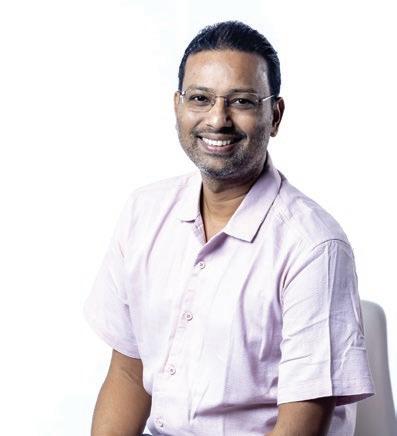
Avlesh Singh is one of the most influential thought leaders in the IT ecosystem in India.
He has enjoyed a remarkable career thus far, one which has seen him build the technology backbone for burrp, India’s first restaurant recommendation engine.
However, in 2011, he decided to venture into the SaaS space, and along with Ankit Uterja, they founded WebEngage.
In a compelling interview with CNME, Singh documents the journey the company has undertaken, the marketing pain points that it is trying to address – and why the company is now wellpositioned to really scale and achieve unicorn status in the very foreseeable future.
He began the conversation by highlighting some of the key driving factors that motivated him and his business partner Ankit Uterja to lauch WebEngage.
“I think it’s fair to say that in the last 12 years, all we have done is survive. However, what I always tell my team is that if
we can survive over the next 10 years then we will become a very large company. The challenge for all businesses is staying alive and relevant, but thankfully we’ve managed to do that thus far in our own journey. It started as a very humble onsite conversion tool, which was driven by our
own experiences of what we saw when working with our previous start-up company.
The need that we identified was that the marketing department in any internet company globally struggles to basically use their own website as a marketing collateral. Websites are hardwired, so making changes, or having a message that is targeted, or in real-time is hard to do, it becomes a development and technical problem rather than a marketing one,” said Singh.
Singh had a strong desire to change that problem for marketing and sales teams globally, and wanted to equip them with a platform that could enable them to put out promotions and offers to users that were already visiting their website.
“We essentially built the platform to empower marketeers, and that was our first version of the product.
Brands today continue to spend almost 85% of their digital marketing budgets with Google and Facebook.”
We raised some capital on the way, and it was essentially a DIY SMB SaaS product that we sold for $3,000 annually. There was minimal integration and you’d be up and running in a matter of minutes. That was our design philosophy, and it was very successful. By 2015, we had over 50 employees and were generating around $2.5m per-year.
However, as Singh explains, he and Uterja decided to complicate things.
“The key rationale behind our decision to pivot the product was the fact that any space like this in marketing can very quickly become commoditised. We were working with some big players in both India and the United States, but Ankit and I came to the conclusion that if we can’t make money off these types of companies then who can we make money from? There were other factors behind our decision to pivot, but this was fundamentally the primary reason to shift focus,” said Singh.
The CEO of WebEngage pointed out that the decision to pivot the platform resulted in them embarking on a journey of discovery.
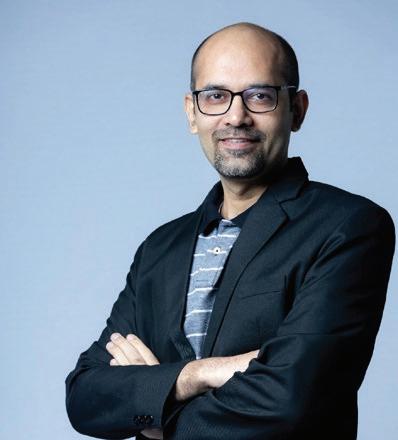

“When we looked to change direction, it ultimately led us to discovering more problems around what we were actually trying to solve in the first place. The problem we were
trying to solve initially was all around onsite conversion. When someone visits an e-commerce website we know there is an intent there, so the very first version of our product was focused on converting that intent into as many customers as you could. However, we done some internal homework, and spoke to about 50 customers as part of our efforts to find out what exactly it was that their customers were spending money on, and it turned out that the biggest problem they were facing was actually bringing people to their application and website. The discovery also explained why all these brands today continue to spend almost 85% of their digital marketing budgets with Google and Facebook,” said Singh.
As Singh stressed, their inability to retain and direct customers back to their application or website, rather
inevitably drives them to spend that money with companies like Facebook and Google because they simply need people to come back to their website.
“We knew it could be done better, now some people loosely call it marketing automation, but if you go deeper then you’ll see that the term marketing automation has been abused. Marketing automation as a term has been around for 20 years, with players like HubSpot, who were one of the first B2B marketing automation companies. What our peers do in this category is nothing to do with what marketing automation stands for. We provide a deep customer engagement based on data and real-time actionability. There is massive amounts of intelligence
built into that data to send a message to that user that makes sense in that time and that moment,” said Singh.
Interestingly, Singh said that when they launched the new version of their platform in 2017, they opted against seeking venture capital, and said that period was a real defining point in the evolution of WebEngage.
We started on that path in 2015, and it took us about a year to discover the problem and build it out, and then another six months to stabilise the platform. We launched it in July 2016, but the stable product
wasn’t introduced until 2017. Since that point it really has been a phenomenal journey for us. We have built most of this without any capital, from 2017-2021, there was no capital investment, and that in many ways was also the defining years for the company. I think when you survive that phase, and you build and find customers then you’re really laying the foundations for a rock-solid business model,” said Singh.
As Singh outlined, WebEngage have enjoyed success of late, but highlighted how many CMOs are still quite

One third of our top customers incremental revenue comes from WebEngage, so that’s illustrative of how much the impact is when the platform is utilised properly.”
happy to pay for Google ad spend, despite the fact that it is not going to generate new customers for them.
“I think the category is still very much evolving. What we do today is not very common for CMOs, because quite frankly they are still comfortable with spending their digital marketing budgets with Google and Facebook. The irony is if you’re a company of a certain size and scale then you’re capped in terms of a certain market share, so the reality is that everybody has been a customer of you at least once - and within that type of business if you keep going back to Google and Facebook to bring your own customers back then after a point there’s going to be no new customers attracted. I believe that it’s ironic that so many businesses pay Google and Facebook to bring their own customers back to them,” said Singh.
Singh is cognisant of the fact that these attitudes have been harboured over the last two decades and won’t simple change overnight.
He also is acutely aware of the fact that is platform is complex, but he revealed how the company has invested heavily in educating the market on what marketing retention really means in the new digital economy.
“The platform we have is complex and complicated, unlike other versions of our product, making it work takes time. The integration process can take up to 4-5 weeks, and if you’re a large company then that integration process could take up to 3 months. We
have invested a lot of time in educating customers on why they need the product. We run a large University program and certification program designed to educate people on what marketing retention really means, how you think of marketing retention as a stack, and how you set it up. We have certainly overinvested in terms of educating the market in an effort to really make them understand what it is we are talking about – and why it is something they need to be paying attention to,” said Singh.
A strong selling point for Singh and his team is the fact that the top customers who use their platform effectively have yielded tremendous economic benefits as a result.
“Look, nearly one third of our top customers incremental revenue comes from WebEngage, so that’s illustrative of how much the impact is when the platform is utilised properly. However, it's a cycle, they don’t get there on Day 1, but again like I said it’s their own customers - we’re just helping to bring them back,” said Singh.
In the world of venture capital and fundraising, it might be suggested that many tech companies are more than happy to take investment regardless of the risk.
However, that is a claim that can’t be levelled towards WebEngage, who have adopted a very ethical approach when it comes to raising capital.
“In the context of fundraising, we believe that if we can’t make money for the people that we are taking
money off then we would rather not risk it. That’s our approach, we are not saying it’s the right approach for everybody, but as a company we feel obligated when we take capital off people to return it with the promises we have made,” said Singh.
Interestingly, Singh believes that the burden of returning that capital and some doesn’t just lie on his shoulders.
“It’s not just my responsibility, the responsibility is on the entire company. I believe it is the responsibility of everybody at WebEngage to make sure that all the shareholders and investors get their return on the capital that they have invested. That takes a lot of maturity, your teams and functions need to mature, and your internal reporting and mechanisms need to mature for you to be ready to take that risk,” said Singh.
He concluded a brilliant conversation, by once again reiterating that it wasn’t that he didn’t want funding earlier in their journey, but that the company had to be ready before taking that next step.
“The reason we didn’t jump into that boat earlier as a company, wasn’t because I didn’t want it, the primary reason was we were not ready to take that plunge. In the last year, we came to the conclusion that we had found our niches that we wanted to focus on, both in terms of customer and regional segments – and we also identified the long-term plan of what this business is going to be, and what we are trying to build. Once we established this then we were ready for investment,” said Singh.
CNME Editor Mark Forker spoke to Bill Qian, CEO of Cypher Capital to find out how continued investments in Web3 infrastructure will help drive the new digital economy, have investors lost trust in cryptocurrency – and why the UAE’s openminded approach to regulation has made it a global hub for crypto exchanges.
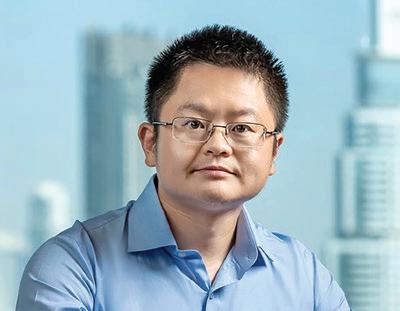
Can you provide us with a broader overview on what Cypher Capital does - and how its investments in Web3 infrastructure will help drive the new digital economy?
Cypher Capital is a forwardlooking investment firm that focuses on identifying and supporting innovative projects within the Web3 ecosystem.
Cypher Capital recognises the transformative potential of Web3 and seeks to play a proactive role in its development.
In terms of Cypher Capital's investments in Web3 infrastructure, the company strategically allocates resources to projects and technologies that underpin the Web3 ecosystem's growth.
These investments encompass a wide array of areas, including blockchain platforms, decentralised finance (DeFi) protocols, non-fungible tokens (NFTs), decentralised identity solutions, and more.
By contributing financial backing and expertise to these foundational technologies, Cypher Capital helps to build
the essential building blocks of the new digital economy.
The impact of these investments is multifaceted. Firstly, they contribute to the creation of a more democratised and inclusive digital economy.
Web3 technologies enable greater participation, allowing individuals around the world to access financial services, participate in digital markets, and exercise ownership over their data and digital identities.
Secondly, Cypher Capital's investments foster innovation and collaboration.
By funding and supporting projects that explore novel use cases and applications for
blockchain and decentralised technologies, the firm encourages the development of groundbreaking solutions that can potentially reshape industries, from supply chain management to entertainment.
Cypher Capital's investments in Web3 infrastructure are not just financial endeavors, but strategic contributions to a new digital era.
By nurturing the growth of decentralised technologies, the firm actively participates in shaping an economy that empowers individuals, fosters innovation, and promotes trust in the digital realm.
There has been an evolution from Web 1 to Web 3, but can you shed light on the evolution of the UAE's relationship with the international cryptocurrency community over the last couple of years?
How has that relationship evolved over time?
I think regarding the UAE, initially, the country has not been that significant in the global crypto community.
However, over the past 20 to 36 months, a series of changes
to visa regulations has played a pivotal role in propelling the UAE into a central position within the global Web 3 and cryptocurrency community.
This transformation can be attributed to the implementation of more permissive regulations by the UAE, in stark contrast to other nations like China that have imposed bans on cryptocurrencies without clear justification.
And I think the US is way too aggressive rather than managing it in a proper way. In contrast, the UAE stands out for its sophisticated and openminded approach, welcoming global entrepreneurs, and investors.
So that's one thing. And also, the country, in general, not only for the crypto community but also for technology investments and start-ups, the policies here are very good and relaxed because it is very easy to set up an offshore company and levies zero corporate tax. It is also easy to issue a working visa in general in the UAE. Yeah, and on top of that, I think that the time zone here is also
very favorable for founders based in the country as it is convenient to deal with Asia, Europe and the PST and the Eastern Time.
So, for those kinds of reasons, the UAE did not set up the crypto community organically. Organic means like let's say, you know Silicon Valley have their university here.
Has investor confidence been rocked by high-profile crypto scandals such as FTX and Binance? Have investors been put off by concerns over cryptocurrency, or does the industry remain in a good place? Yeah, I think there has been a positive and negative driver for crypto in the past 12 months.
But from the result perspective, I do want to remind every audience that Bitcoin is the most outperforming asset class this year. I think it has doubled already.
For the number, maybe we can check after the interview, but basically Bitcoin is the most outperforming asset class. It outperforms US equity, global real estate or corporate bond, and many others.
So, but also like, you know, the counter argument would be that Bitcoin will drop a lot like the last season, right? Still, we can see.
But this is sort of like a signal of the resilience of crypto. I want to elaborate on
one example. During the week of the collapse of the Second Valley Bank, Bitcoin went up because people are losing face more or less to the traditional financial institution.
And I feel like at the end of the day, being backed by a centralised credit is not that credible as compared to those backed by the mathematics, which is Bitcoin.
So, I think those are the pros of the crypto world. But of course, like any other, there are a lot of drawbacks to digital currency as well.
For instance, FTX, Lunar and also the controversy about the Binance etc. And we feel like this is literally a dark forest. It's like the Wild West Gold Rush.
So, at the end of the day, people can win the game as long as they don't have the bottom line. They can play any kind of unethical game with their coding capability.
So, this is negative. But this can turn out positive in the long term because of FTX, or Lunar, etc. Now the regulator. This is not a dark forest, as I can just leave it away. I have to tap into and protect the retail investor and their interest, etc.
I would definitely concur with you that crypto is a legit industry. However, how does it go to the next level, what is the future of cryptocurrency?

I think the key thing about crypto in the future - I would divide it into 3 categories. The first one will be the use case. So far, for crypto, it's still like another brand-new digital Fintech.
Apart from fintech, trading, etc., there's no other daily life
Cypher Capital's investments in Web3 infrastructure are not just financial endeavors, but strategic contributions to a new digital era.”
use case. I mean for the Web too. You know there are no other daily life use cases, not only about payment through Apple Pay, which is a Web 2 experience, right?
But we also check Netflix, we check WhatsApp, all those are the daily active use cases.
But for Web Three, we still lack the real, highly frequent daily use case, which we need to work along with the founders and developers in the future.
And let's imagine that in the foreseeable future, there will be like a billion users who are using the web suite. And let’s say that the website is going to be double digit trillion dollars. So that's one driver. The second thing would be the rules of the game.
Before there was literally no rule of the game. SBF can move all the money from the user account to do their leverage, et cetera. And those kinds of things have certainly been forbidden in the traditional Fiat and the financial industry since maybe 100 years ago.
We only see those kinds of scams in the traditional finance industry, maybe back in the 19th century. But it's never the case in the 20th century.
But in crypto, those kinds of scams are still happening. So, I think the rules of the game would be very important.
The third thing would be the backbone, which is the technology used. So, the reason that we invest in a lot of technology and founders is because we have a strong faith at the end of the day. Of course, the use case needs some inspiration.
I mean, like Facebook or WhatsApp. You know, those kinds of ideas are inspired by
some certain great founders, but also these inspirational use cases need to be delivered through sophisticated technology and infrastructure.
You described the UAE's regulation towards cryptocurrency as being 'open-minded', and that is why it has become so attractive to crypto exchanges. However, can you elaborate more on how the UAE is ahead of the curve when it comes to digital asset regulation?
Yeah. The country welcomes all the global founders instead of just pushing them away without any sort of sophisticated research or decision-making process.
of founders will attract more founders. That's why.
One thing is like, we do the Bitcoin self-mining through our own pocket. And the second way is our investments in great projects, like good tokens in the public market.
When will we see adoption in the use of cryptocurrency amongst the mainstream, and what are some of the various usages of it in terms of industry verticals outside of FinTech?
Yeah. I think there are a lot of well adopted products. They are adopting crypto into their use case. Just several days ago, PayPal announced that they're going to launch a stable point as well.
I think this attitude is great enough to accept and attract a lot of the founders.
The thing is a lot of founders got very harsh treatment in other jurisdictions, by different investigations, by civil charges.
So, I think at the end of the day, the founders have a strong passion and are very selfmotivated. As long as there's good jurisdiction.
The reason to set up a start-up is the environment that welcomes them and also where they have access to a good facility, the investor community, the startup, the incubation ecosystem, etc. In the end, all of this will attract more founders.
After they track the first batch of the founders, it will sort of have a flight wheel effect, right? The first batch
Imagine like, more than 400 million global users obviously including users from the MENA region. They began to transfer the money to all their global friends.
Before the cost was like 1 per cent or 2 per cent, but now literally, with the help of the stable point, it will decrease to nearly zero. And the speed is going to be instant as well. So, I think for those kinds of adoption, change is significant to lead to the next season of crypto.
I think the next season of crypto adoption, not only in the MENA region but globally, is going to be a massive adoption. Either in fintech or peer-topeer money remittance, or other range of the use cases, like the social network and entertainment.
Cypher Capital's investments foster innovation and collaboration.”

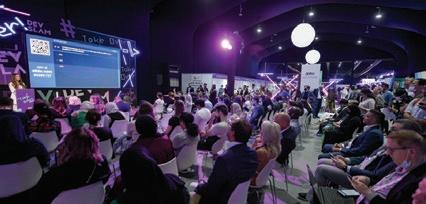




The unified platform for digital transformation.
• Enable autonomous operations.
• Control costs and complexity.
• Increase agility and productivity. solarwinds.com
